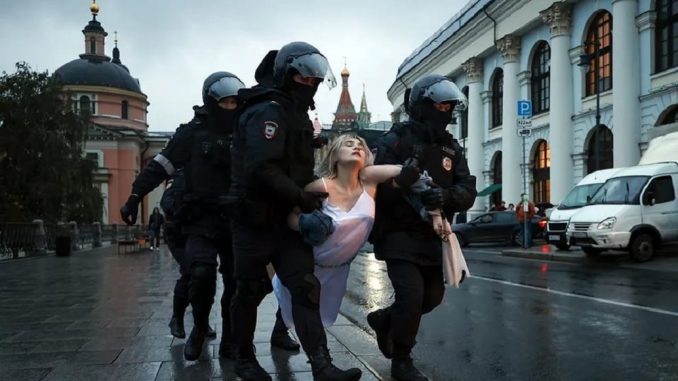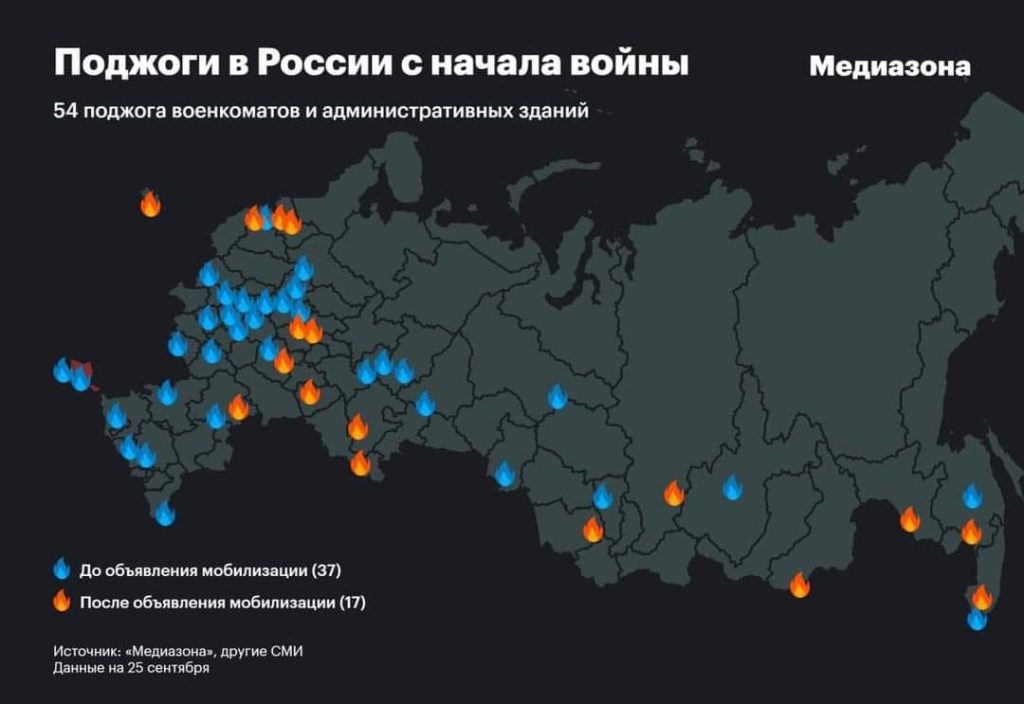
Putin had “referendums” held, which are a farce of self-determination, as new justifications for the invasion. In response to the Ukrainian counter-offensive, he has called for a massive mobilization which is increasingly meeting with popular rejection. The Kremlin regime puts into action all its repressive and propaganda apparatus to sustain its justifications for the invasion, including threats to use nuclear weapons. The mass exodus of Russians who do not want to go to the front lines is accompanied by growing protest actions and sabotage. Dissatisfaction with the growing war in the Russian Federation was expressed in Dagestan.
By Kazimierz Kryzhich, from Russia.
On September 27, in the occupied territories of Ukraine (Donetsk, Lugansk, Kherson and Zaporiyia regions), the so-called “referendums” on the accession of these territories to the Russian Federation ended. According to the organizers of the voting, the accession of the Donetsk People’s Republic to Russia was supported by 98.63 % of voters (according to the results of processing 94.50 % of the protocols). In the Lugansk People’s Republic, 97.87% (90.95% of protocols) were in favor. In Kherson region, 96.75% (100% of processed protocols). In the Zaporiyia region, 97.8% (90% of protocols processed).
Russia staged shams of self-determination
Holding a “referendum on self-determination” in conditions of foreign occupation not only violates all norms and principles of international law, but also does not conform to the elementary logic of common sense. Moreover, none of the regions is completely controlled by Russian interventionists, and Zaporiyia (the capital of the Zaporiyia region) remains under the rule of the Kyiv administration and the Ukrainian armed forces. But the Kremlin has long been inadequate in its actions and deeds. Attempts to realize imperial ambitions at all costs, as well as Putin’s mad desire to go down in world history as a “great collector of Russian lands,” cast serious doubts on the mental health of Russia’s ruler and his inner circle.

Mobilization is more than partial
On September 21, in parallel with the preparations for the holding of referendums, Vladimir Putin announced a “partial mobilization”. Officially, the Kremlin intends to summon another 300,000 people to the Ukrainian front, but according to various sources, the real number mobilized should be at least 1,200,000 people. To take such an unpopular step, the Russian authorities, who until recently declared loudly, in the person of their president, that there would be no mobilization, were forced by the rapid advance of the Ukrainian army in the direction of Kharkiv and the success of the counteroffensive in the Kherson region. In just a few days the territories that Russian troops had captured and occupied for six months were liberated. Analysts estimate that Russia has lost tens of thousands of troops and hundreds of military equipment.
The Kremlin’s propaganda machine in action
As a result of a serious defeat on the battlefield, the Kremlin’s “victorious” rhetoric also changed dramatically. Now, according to Kremlin propaganda, it is no longer Russia that is at war with Ukraine, but the entire Western world is at war with Russia. Russian propagandists are desperately convincing the country’s population that Ukraine no longer exists, that it is NATO troops that are attacking their battle formations and shelling their peaceful cities. There are so many lies, falsifications, aggression and misanthropy generated by the Russian propaganda to the outside world, that humanity has not known since Nazi Germany.

Internal repression, external nuclear threat
The members of the State Duma openly call for the stripping of citizenship of all opponents who left the country and the creation of concentration camps for those who continue to fight against Putin’s regime or do not support the war with Ukraine. Threats to use nuclear weapons are heard at the highest level of Russian power. “When its territorial integrity is threatened, Russia uses all means. And this is not a bluff,” Russian President Vladimir Putin said on September 21. On September 22, Russian Security Council Deputy Chairman Dmitry Medvedev announced that any weapons in Moscow’s arsenal, including strategic nuclear weapons, could be used to defend Russian-annexed territories in Ukraine. Russian Senator Konstantin Kosachev warned that after the referendums, “Protecting the people of this region will not be our right, but our duty. An attack on people and territories will be an attack on Russia. With all the consequences.” Russian Foreign Minister Sergei Lavrov also did not rule out the use of nuclear weapons to protect the annexed Ukrainian territories.
Improvisation and incompetence in the call for action
The “partial mobilization” announced by Putin is more an attempt to demonstrate publicly to the West the seriousness of the Kremlin’s threats. However, from the first steps of the implementation of the mobilization measures, the total inferiority of the bourgeois state was revealed, which was affected by the total corruption, theft and terrible incompetence of the local authorities. In the ranks of the mobilized are summoned all indistinctly. The local authorities are trying to fulfill the plan in terms of number and not quality of mobilizers. There are many cases where summons are given to people of retirement age, cancer patients, the disabled and those who simply have no experience of military service. Mobilizers cannot be provided with normal food, uniforms, ammunition and basic necessities.
Mass exodus in order not to take part in the invasion
The absolute lack of motivation to die for the interests of the Kremlin clique provoked a mass exodus from Russia of the most talented and economically promising male part of Russian society. In just one week, more than 260,000 Russians left the country. They are mostly well-educated young people with high qualifications. Georgia, Kazakhstan and Uzbekistan declared their readiness to accept on their territory those who refused to fight in Ukraine. Former Mongolian President Elbegdorzha Tsakhiagiina also said that Ulaanbaatar “will meet with open arms and open hearts” such Russians as “Buryat-Mongols, Tuva-Mongols and Kalmyk-Mongols”. At the same time, he noted that other Russians are also expected “all over the world,” including in Mongolia. At the same time, governments in Europe are considering the issue of accepting Russians fleeing from being sent to the Ukrainian front.
The Russian working people have taken action again
Despite the total suppression of dissent and any manifestation of public disagreement with the Kremlin’s policies, Russian society has not remained oblivious to the grievances. Protest actions, although not as massive, spread across many Russian cities. To date, more than two thousand people have been detained. Even in Chechnya, where Ramzan Kadyrov holds absolute power, in Grozny about a hundred women came out to protest against the mobilization. Literally the next day, Kadyrov addressed the mothers of Chechnya and announced the cessation of the mobilization, as the plan had already been overfulfilled.
Protests and repression in Dagestan
The toughest confrontation between the authorities and the people took place in Dagestan. On September 22, on the second day of mobilization, residents of the village of Babayurt blocked the federal highway and went to the local military registration and enlistment office. On September 25, residents of Endirey village in Khasavyurt staged a spontaneous protest against the mobilization and blocked the Makhachkala-Khasavyurt road. Police fired in the air to disperse the protesters.
On the evening of September 25, protests also swept Makhachkala, where City Day was celebrated, and there were many women among the demonstrators. They went to the center of Makhachkala. There were many women among the protesters chanting, “No to war!”, “We are for peace!”. “Our children are not manure!” “Ukraine did not attack us!” “This is not our war!” During the dispersal of the demonstrators, the military were forced to shoot in the air, during the arrest they acted with extreme cruelty, more than a hundred demonstrators were detained.
Dagestan, in percentage terms, is the leader in irrecoverable losses in the war with Ukraine. The number of Dagestanis killed is estimated at about a thousand people. Protests in Dagestan may again flare up the Caucasus in the struggle against the yoke of Moscow. And today, the chances of the Kremlin winning in this region are much lower than during the last Chechen wars. To suppress the protests, servicemen of the Russian Guards of the Stavropol Territory, mainly of Slavic nationality, were deployed in Dagestan.
Dissatisfaction with the war is growing
Along with peaceful demonstrations against the war with Ukraine, more radical protests have become more frequent. A wave of arson attacks on military commissariats and local administrations spread across the country, and in Ust-Ilimsk, Irkutsk region, mobilized worker Ruslan Zinin shot a military commissar with a sawed-off hunting rifle right in the assembly hall, declaring that no one would go into combat. Despite the incantations of Kremlin propagandists that Russian men support mobilization and are ready to fight with Ukraine and the entire Western world, fulfilling their military duty to the “Homeland,” public discontent continues to grow, as does the realization that this war is predatory and unjust. The issue of duty to the Fatherland was well revealed by one of those who fled the mobilization to Georgia: “Duty to the Fatherland? After they deprived us of our future, after they took away our pensions, after they took away our jobs by going bankrupt and selling companies, after they took away all social gains again and again, after they took away our right to vote, after inflation devoured the meager income, after we were maimed and killed, after the whole world was disgraced and ashamed of even the citizenship of this country, who owes what to whom? This gang of scum, who call themselves the homeland, is trying to impose on us some kind of imaginary debt to them, like a mobster with a stall in the market. In fact, this damned homeland owes us in such a way that it will never repay – for death and tears, for hunger and orphanhood, for sickness and poverty, for the shame of being called a citizen of this terrible, ugly and monstrous empire. And, god knows, we will yet come to avenge these debts!”








